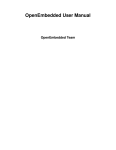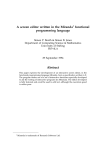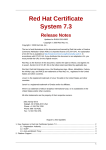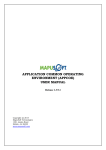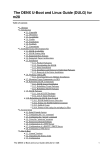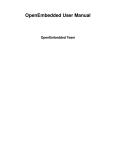Download MontaVista Linux 6 Technical Brief
Transcript
MontaVista Linux 6
Technical brief
The MontaVista Linux 6 Technical Brief provides a technical overview
of MontaVista Linux 6 (MVL6) and each of its components including
Market Specific Distributions (MSD), the Software Development Kit
(SDK), and the MontaVista Zone Content Server. The Technical Brief
concludes with an overview of MontaVista support and maintenance,
and a glossary of new terms and definitions important to understand
when learning about MVL6.
Table of Contents
» MontaVista Linux 6: The New approach to Embedded Linux Development
» Market Specific Distributions
» MontaVista Software Development Kit
» Cross and Native Development Toolchains
» MontaVista Integration Platform
» MontaVista DevRocket 6 IDE
» MontaVista Zone
» Customer Support, Quality Assurance, & Training
MontaVista Linux 6 Technical Brief
MontaVista Linux 6: The New Approach to
Embedded Linux Development
MontaVista Linux 6 meets embedded developers where they are in the
development cycle with a complete embedded Linux distribution and
developer tools for a faster time to development. With Market Specific
Linux. They do this to showcase their newest products running reference
Linux implementations.
Our new MSD approach simplifies the process of selecting and
transitioning to a Linux commercialization partner such as MontaVista.
Distributions, the MontaVista Integration Platform, and unprecedented
Device Manufacturers
flexibility in a commercial solution, MontaVista Linux 6 enables developers
to build from source to more easily customize their software stack and
add product-differentiating features.
The MontaVista Linux 6 Technical Brief provides a technical overview of
linux 6
MontaVista Linux 6 (MVL6) and each of its components, including Market
Specific Distributions (MSD), the Software Development Kit (SDK), and
the MontaVista Zone Content Server. The Technical Brief concludes with
an overview of MontaVista support and maintenance and a glossary of
new terms and definitions important to understand when learning about
Semiconductor Linux Technology
MVL6.
MontaVista Linux 6
MontaVista Support and Maintenance
Software Development Kit
Integration
Platform
MontaVista
Zone
Content
Server
CrossDevelopment
Toolchain
DecRocket
Eclipse IDE
Market Specific Distribution
Kernel
Userland
Open Source Projects
(kernel.org, GNU, USAGI, Apache. etc.)
Figure 2 - MVL6 aligns the embedded Linux supply chain to simplify the transition to a Linux commercialization partner
What is a Market Specific Distribution?
Each MSD is a specialized set of Linux technology that includes a Linux
kernel, software libraries, and other applications that are collectively
Figure 1 - MontaVista Linux 6
referred to as a “distribution.” In the enterprise software world Linux
distributions are typically intended for general purpose usage. This isn’t
Market Specific Distributions
true however in the embedded market. Embedded software developers
MontaVista Linux 6 introduces a powerful new approach to embedded
face unique market demands and design challenges that drive the
Linux system design that benefits developers like never before, Market
adoption of specialized hardware platforms.
Specific Distributions. Traditionally companies like MontaVista have
modeled their products similar to the RTOS world. RTOS vendors
Each MontaVista Linux 6 MSD is designed to deliver the appropriate
generate “board support packages” (BSPs) that adapt a predefined
Linux technology for the target hardware platform and the hardware’s
product as little as possible to execute on a new hardware platform. This
intended market application(s).
model was sensible in the era of proprietary software platforms because
the vendor was the only true innovator in the software supply chain.
Feature Compatible with Semiconductor
Linux Technology
The open source revolution has changed the embedded software supply
Most development projects begin as an in-house prototyping effort to
chain. Now a worldwide ecosystem of developers contributes to Linux.
prove the technology assumptions and justify continued funding. During
Semiconductor and processor vendors such as Intel, Texas
this period, developers often begin their work using Linux technology
Instruments, Freescale, ARM, MIPS, and others have shifted strategies
from their semiconductor partners, and often within an emulation
and now actively innovate within the open source process to enhance
environment on prototype silicon reference platforms. These reference
2
MontaVista Linux 6 Technical Brief
implementations are typically well integrated with the hardware, but lack
SDK Host Support
many non-hardware specific features that may be required to deliver a
Developers often must plan for a decade or more of engineering and
complete commercial product. Technical support and updates on these
maintenance on a new product release. It is critical that the SDK used
reference implementations are often extended only to the top customers
in their design have broad host support and minimal dependencies
of each new semiconductor product.
upon the host that may impair compatibility with future host operating
system versions. Since no company can anticipate what changes may be
When it comes time to transition to an embedded Linux
introduced in future host operating systems, MontaVista has adhered to
commercialization partner MontaVista can help. The MontaVista Linux
available standards in order to best position the MVL6 SDK for future host
6 Market Specific Distributions are engineered to be feature compatible
operating system compatibility.
with the Linux technology produced by our semiconductor partners.
Developers selecting MontaVista should be able to easily transition their
The MontaVista Linux 6 SDK is engineered to only rely upon Linux
applications and device drivers to MontaVista Linux. Each MSD uses the
operating system components and APIs defined by the Linux Standard
same or a newer base kernel version in order to assure feature
Base (LSB) 3.1 standard1. While not officially supported, current and
compatibility.
future host operating systems compliant with the LSB 3.1 standard have
an improved likelihood of successful execution of the MontaVista Linux 6
Aligned with Your Design Needs
SDK.
Modern System-on-chip (SOC) designs often involve a complex software
stack that extends far above the Linux kernel. The new MSD approach,
MontaVista Linux 6 is tested and officially supported on current versions
pioneered by MontaVista, ensures developers have the right software
of Ubuntu, SuSE, and Red Hat Enterprise Linux.
(kernel, drivers, and userland) necessary to get the most out of their
selected hardware. In some cases this may mean testing with proprietary
audio/video codecs or delivering unique virtualization technologies that
exploit the hardware architecture. The MontaVista MSD design process
delivers, or is compatible with, key supporting technologies that are
typically excluded from a generic Linux but necessary to meet
commercial embedded requirements.
Development Host
Processor
Red Hat Enterprise Linux 5.3
X86, 32 and 64 bit
openSUSE 11.1
X86, 32 and 64 bit
Ubuntu Desktop 9.04
X86, 32 and 64 bit
Table 1 - MontaVista Linux 6 tested host distributions
Pre-Integrated and Tested
Host Packages
Developer time spent integrating individual components, fixing
The MontaVista Linux 6 SDK includes various host packages which are
homegrown tools, or backporting features adversely impacts project
compiled and execute on the development hosts listed above. Each of
schedules, reduces developer productivity, and ultimately adds nothing
these packages is intended to help support the execution of the SDK and
to differentiate the device. The MontaVista MSD approach selects and
its primary functions: building software and images via the bitbake
integrates a broad array of popular open source software that most
command and execution of the GNU Compiler Collection utilities.
projects require. Our quality assurance practices identify defects and fixes
them before they can impact project schedules.
MontaVista Software Development Kit
Target Packages
Target packages are provided for development via the delivery of multiple
collections. Each collection provides numerous recipes that can access
The MVL6 Software Development Kit (SDK) brings together all the
original source code from the MontaVista Zone, patches that modify the
essential tools for successful embedded Linux product design that every
original source code, and automated instructions to build and create the
developer needs to work efficiently. These include:
resulting binaries and optional binary packages. Each recipe may create
• The MontaVista Integration Platform (MVIP)
many binary packages so that developers can easily add or remove
• MontaVista DevRocket Integrated
components they require in their final system images.
Development Environment (IDE)
• Complete toolchain that includes a set of GNU compilers and utilities, cross compilers for non-Linux runtime environments, For more information about collections and recipes, see the MontaVista
Integration Platform section below.
and on-target key system libraries
The MVL6 SDK ensures developers have a high quality, pre-integrated
set of development tools that can quickly be deployed to engineering
workstations and generate repeatable results.
3
1 Consult the Linux Standard Base website for more information at
http://www.linuxfoundation.org/collaborate/workgroups/lsb
MontaVista Linux 6 Technical Brief
Cross and Native Development Toolchains
Non-Linux Runtime Environments
Developers preparing their own toolchains often fail to properly isolate
Select MSDs include support for non-Linux runtime environments. These
their host development system from their cross compilation tools. When
non-Linux runtime environments are typically used for dedicated
this occurs, the symptoms can be subtle and not detected until late in the
execution of small applications linked to a simple utility library that
development cycle. Common issues include cross compilers that cannot
provides basic services. The SDK for these MSDs includes an additional
be run on alternate development hosts, or target software improperly toolchain that targets this environment and includes the required target C
utilizing host kernel and library headers. Some developers even resort
library. The MontaVista Linux 6 SDK ensures that both the Linux and
to never upgrading their host development environment for fear that the
non-Linux runtime environments utilize the same ABI format and a
upgrade will break their commercial products. These typical problems
common set of toolchain versions ensuring developer efficiency.
are easily avoided by using a high quality cross development toolchain,
like the one found in MVL6, which properly isolates the deployed target
Command Line Debugging Using GDB
software from the development environment.
Developers often turn to familiar tools for addressing their most common
challenges. The GNU Project Debugger, commonly known as GDB, is the
MontaVista cross development toolchains can generate optimized code
command line source level debugging tool most commonly turned to by
for the following processor architectures2:
developers targeting Linux. Table 2 shows the GDB usage for running the
debugger in particular modes of MVL6.
CPU
Configuration
ARMv5T
Little-Endian, ARM
Mode
Usage
Cross, Remote gdbserver, Live
application debug
Debugging of currently executing
userspace applications
Cross, Remote KGDB, Live kernel
debug
Debugging of currently executing core
kernel or kernel modules
Cross, Core-file, Post-mortem
application debug
Debugging of failed applications which
have created a core file
Native, ptrace, Live application debug
On-target debugging of running
applications
Native, Core-file, Post-mortem
application debug
Debugging of failed applications which
have created a core file
ARMv6
Little-Endian, ARM, VFP
ARMv7-A
Little-Endian, Thumb 2, VFP
MIPS32
Big-Endian, O32
MIPS32
Big-Endian, Soft Float, O32
MIPS32
Little-Endian, O32
MIPS32
Little-Endian, Soft Float, O32
MIPS64
Big-Endian, Soft Float, N32
MIPS64
Big-Endian, Soft Float, N64
MIPS64
Big-Endian, Hard Float, N32
MIPS64
Big-Endian, Hard Float, N64
MIPS64
Big-Endian, simple exec
Power 603
32-bit, Soft-Float
These include the GNU C and C++ libraries (glibc and libstdc++) plus
Power 603
32-bit, Hard-Float
additional ancillary libraries typical for Linux systems. MontaVista utilizes a
Power e500mc
32-bit
Power e500mc
32-bit, bare metal
Power e500v2
32-bit
Power e600
32bit, Altivec
PentiumPro
32-bit
AMD64/Intel 64
64-bit
Table 2 - MontaVista toolchain optimizations
Table 3 - GNU Project Debugger (GDB) modes and usages in MontaVista Linux 6
On-Target System Libraries and System
Size Reduction
Applications running on MontaVista Linux can utilize the core library
components provided by the SDK to support C and C++ development.
specialized version of the GNU C and C++ libraries intended for
embedded systems. The “Embedded GLIBC” (EGLIBC)3 library has
several key advantages over other alternative size reduced C libraries:
• EGLIBC is available on all architectures supported by GLIBC
• EGLIBC supports both C and C++
• EGLIBC is quality software based on decades of effort invested in GLIBC
• The MontaVista EGLIBC based SDK can be deployed in 54% of the storage space typically required by standard GLIBC4
2 Each MSD is shipped with the appropriate toolchain for the intended hardware architecture. Not all MSDs support all available toolchain configurations.
4
3 For further information on EGLIBC consult the EGLIBC project website at http://
www.eglibc.org/home
4 Based on MIPS architecture with all optional components disabled.
MontaVista Linux 6 Technical Brief
MontaVista is leading the market by providing the highest quality C and
Always Original Source + Patches
C++ library code in a size-reduced format that does not impinge upon
MontaVista Linux 6 is a source-driven product that empowers
application compatibility, reliability, or performance. EGLIBC has proven
developers to maintain a stable software base and integrate changes
compatibility with GLIBC as evidenced by the Debian project’s recent
from open source, or local customizations, in order to deliver products to
adoption of EGLIBC as the default C/C++ library for the Debian Linux
market. The source code that constitutes MVL6 is always distributed to
distribution.
the customer in the form of the original unmodified source code archive
from the upstream project plus any patches that might have been applied
MontaVista Integration Platform
in order to resolve defects or improve the software.
The MontaVista Integration Platform (MVIP), and included build system, is
the centerpiece of the SDK. The MVIP creates the original MSDs at install
The MVIP can catalog all of the original source code and patches that
and empowers developers to adapt MontaVista Linux to the needs of
contribute to a customer design and prepare them for distribution. This
their design. The MVIP enables source-driven customization of the entire
“software bill of materials” can be used to help comply with applicable
MontaVista Linux-based software stack and can assist developers with
open source licenses by providing development engineers with a
the following features:
complete record of all source code included in their product.
• Based on de facto standards and an open source core
Build Your Entire Product Line with One Tool
• Always provided as original source + patches
Customers don’t build just one application or product. The challenges of
• Build and rebuild entire product lines with one tool
commercial product development require managing entire product lines
• Structure customizations with collections
with multiple configurations and maintenance levels. Designing complex
• Build-compatible with thousands of community packages
Linux-based embedded systems could mean managing 10+ million lines
• Easily extensible and compatible with automated build
of source code. Developers must be able to ensure all changes to one
• Easy to upgrade and manage change
product configuration are inherited from that version to all of its
• Complements existing SCM systems
derivatives.
Simply dropping all of this code into an isolated Software
Let’s look at each of these areas in more detail.
Configuration Management (aka Source Control Management)
Based on De Facto Standards and an
Open Source Core
system like CVS, ClearCase, or Subversion isn’t going to suffice because
At the heart of every embedded Linux development project, the build
continuously submitting changes, and partners that contribute to your
system is relied upon daily. Therefore it is imperative the build system be
product development evolve their code as well.
the code will be updated periodically. The open source community is
reliable and flexible in order to address unforeseen requirements. Build
systems are also inherently difficult to change once integrated into the
Intermingling community, semiconductor partner, commercial Linux
daily developer workflow and supporting automation. For such a critical
vendor, and local development team patches into one development
need, developers should only rely on tools with a proven heritage of
stream inhibits progress and can result in confusion when components
satisfying requirements similar to their own. Using these criteria,
are upgraded independently.
MontaVista selected the BitBake utility as the core for the MontaVista
5
Integration Platform. The BitBake utility falls under the umbrella
By integrating with your SCM system, tracking changes to community
OpenEmbedded (OE) project and has been a key enabling technology of
code, and managing dependencies, the MVIP helps you manage this
the OE project since 2004.
constantly changing process, ensuring you have successful, repeatable
6
builds.
The BitBake-powered MVIP benefits developers by ensuring they do not
have to invest in learning a proprietary, vendor-specific technology that
may not be flexible enough to accommodate future requirements.
Structure Your Customizations with Collections
The MontaVista Integration Platform’s powerful task and collection7
powered system can use shared collections for common elements while
extending or replacing software elements that are unique to one offering
in the product line. The shared collections and inherited configuration
settings save valuable time across projects through reduced update and
5 Consult the “BitBake User’s Manual” at http://bitbake.berlios.de/manual/ for additional technical details on BitBake
6 See http://www.openembedded.net/ for more information on OpenEmbedded
5
maintenance overhead while improving build performance.
7 See end Glossary for definitions to commonly used terms in MVL6
MontaVista Linux 6 Technical Brief
from the evolving base of Linux software which together represents your
Easily Extensible and Compatible with
Automated Builds
product design. Ultimately, collections save time and reduce repetitive
Engineering best-practices recommend continuous and automated build
work by helping developers more easily structure and maintain source
systems be used for ensuring repeatable builds and monitoring software
code and customizations.
quality. This time saving ability enables teams to leverage off-hours to run
Collections ensure locally generated software contributions are isolated
systems 24 hours a day. Developers have full control of the MVIP directly
MontaVista MSDs are fabricated out of one or more collections. Each
from the command line and they can introduce their own extensions by
collection can introduce new software packages, patches, or
utilizing the Python scripting language. This lets them create new tasks
configuration changes to the software stack build. Collections are
that are automated and integrated into the build environments.
stacked on top of each other and each collection can replace software
Easy to Upgrade and Manage Change
packages from lower components.
With developers enhancing and maintaining multiple commercial
Each MVL6 MSD is typically composed of the Foundation, Core, and one
products, efficient change management is an essential competency.
MSD collection. Depending on the hardware capabilities other collections
Simplistic techniques, like checking the Linux kernel source code into a
may be included as well. Current collections include8:
revision control system, cannot ensure the entire product line is
maintainable, reproducible, and can be enhanced without breaking other
Name
Summary
Foundation
The essential development host and target
recipes required for building and running a
small Linux system. The majority of these
support building the small set of target
packages provided
100
An expanded set of recipes for expanded
Linux system functionality
160
Core
MSD
Recipes
builds. With the MVIP developers can:
• Control the introduction of unplanned software updates by
“locking down” the build configuration
• Generate test builds of new configurations that can be rolled back to known good configurations
• Work cooperatively with your revision control system to manage Each MSD is delivered with a collection
named after the MSD containing the Linux
kernel. May also include other MSD specific
software not bundled with other collections
1
Audio
Audio recording, playback, and manipulation
3
Bluetooth
Support software for Bluetooth radio support
2
Complements and Integrates with Your
Existing SCM System
Graphics
Base X.org support and programming
libraries
40
Most companies have standardized on a corporate Software
Wireless
Wireless networking utilities
4
Table 4 - Example collections associated with MontaVista Linux 6
Build-Compatible with Thousands of
Community Packages
As mentioned, developers often must supplement the software
packages available from MontaVista with additional packages from the
open source community. With the MontaVista Integration Platform this
common practice is now simplified. The MVIP is compatible with the
recipe format used by the OpenEmbedded community. Developers can
now select from over 6000 packages via OpenEmbedded and add them
to their MVIP managed projects.9 Refer to Appendix B for an example of
an OpenEmbedded recipe.
8 Specific MSD’s may require alternate or upgrade versions of the components listed. Recipe counts are approximate and will change over time.
9 MontaVista standard technical support applies only to packages distributed as part of a MontaVista created collection in a MSD. Professional services are available to support other available software packages.
6
the entire software stack configuration, sources, and
• customizations
Configuration Management (SCM) system for managing the evolution of
their software assets. The MVIP can be used with many SCM systems,
including popular commercial and open source options (i.e. CVS,
Subversion, and GIT), by simply controlling updates to your project
directory and archiving the original source code and metadata
collections. This clear methodology assures developers their software
build components are fully archived and their builds will be reproducible
in the future.
For larger teams that may use multiple SCM systems, the MVIP has the
flexibility to directly access more than one system in order to pull code
directly into the build. Each software package that contributes to the
build can be fetched from a defined SCM. For added convenience,
source code, binaries, and patches stored in compressed tarballs can
also be fetched via HTTP/HTTPS or from the local file system. The MVIP
is meant to seamlessly integrate into your existing development
environment, not disrupt it.
MontaVista Linux 6 Technical Brief
MontaVista DevRocket 6 IDE
support a wide range of target services that otherwise would need to be
MontaVista DevRocket 6 is the Integrated Development Environment
manually set up by the developer. These prerequisite services include file
(IDE) that supports MontaVista Linux 6. DevRocket 6 delivers a set of
and process management, remote terminal/shell, and fully automated
tools designed to streamline and automate common embedded Linux
debugging and analysis.
development and analysis10 tasks. DevRocket 6 is based on the Eclipse
project and is delivered as a set of Eclipse plug-ins that increase
Fully Automated Edit/Compile/Debug
developer productivity by simplifying the complex tasks of embedded
MontaVista DevRocket accelerates time to market by delivering a
Linux development. DevRocket 6 plug-ins can work within standard
streamlined and fully automated edit/compile/debug cycle, thus
Eclipse-based platforms based on the Ganymede release or with the
eliminating the multiple manual and error-prone steps involved in building
bundled Eclipse runtime delivered with MVL6.
binaries, copying them to a target, launching the debug server, and
connecting back to the host. DevRocket 6 manages deploying
New in MontaVista DevRocket 6: MVIP Projects
applications to the target and identifying the toolchain to construct the
The new MontaVista Integration Platform provides developers with a
correct debug chain for your project. Multiply these time-saving steps
powerful new command-line based tool for customizing and compiling an
across an entire team and it can really affect a products time-to-market.
entire Linux based software stack. DevRocket 6 introduces a new project
type that exploits the power of the MVIP from the DevRocket graphical
Advanced Analysis
user interface.
DevRocket 6 delivers intuitive, interactive, and accessible interfaces to
configure, manage, execute, and present results from best-of-breed
New in MontaVista DevRocket 6: MemTraq
FOSS analysis tools. Significant productivity gains are realized when
Developers building Linux based products often struggle to find memory
solving common analysis questions such as:
leaks in deployed systems. Traditional techniques such as Valgrind or
mpatrol are limited because they require:
• How much memory is my system using and which components are responsible for it?
• excessive CPU overhead
• Where are my system and application performance bottlenecks?
• special runtime configurations that can’t be used in production • What is the source of my memory leak?
deployed systems
• on-target storage for memory trace information
• Which events have transpired on the system and why?
MontaVista Zone
To address these limitations MontaVista created a new memory leak
The MontaVista Zone is an exclusive online support site available to all
analysis framework for MontaVista Linux 6 that integrates at the
current valid MontaVista subscribers.
lowest level of the userspace software stack. This new feature, known
as MemTraq, provides developers with visual depiction of live memory
leak information from running applications without disrupting operation of
the program under analysis. Unlike alternative solutions, MemTraq does
The MontaVista Zone provides 24x7 access to:
• Downloads for the latest software releases, updates, and up
grades
not require invasive binary patching of applications while running and
• Online documentation
can operate without slowing down the application being analyzed. These
• Frequently Asked Questions (FAQs)
enhancements enable developers to gain efficiencies in tracking down
• Interactive online tutorials
memory leaks in order to deliver devices to market with higher quality.
• Open and closed known problem reports (with the resolution for each closed problem report)
Target Management
• RSS feed for notification of all patches/updates
DevRocket 6 utilizes the open source Eclipse target management project
• Proactive security monitoring and patch distribution
called Remote Systems Explorer (RSE) that includes a full terminal
• Detailed list of all hosts and targets supported, by architecture
interface used to log in to and run commands on remote targets.
• Detailed information that covers:
MontaVista created and contributed back to the community an SSH
1. Development Environment
implementation for RSE that allows target management on any
2. Kernel Information
MontaVista Linux target using the industry standard SSH protocol to
3. Application Development
4. Integration/Deployment
10 Debug and analysis tools are dependent upon kernel and userspace features imple
mented in the Market Specific Distribution. Consult the MSD documentation to see if the required features are implemented and supported.
7
MontaVista Linux 6 Technical Brief
Prebuilt Staging Packages
Building an entire Linux, based design from source can take hours.
Developers shouldn’t have to wait while unmodified components are built
from source again and again. The MontaVista Integration Platform has
extended the BitBake utility to generate and use prebuilt staging
packages. These staging packages hold all of the intermediary products
and outputs of a build in a form that can be distributed and shared.
Prebuilt staging packages are used to accelerate the initial usage of the
product and helps developers quickly get started without waiting for an
initial build from source. As developers start to configure their Linux
system the prebuilt staging packages are rebuilt incrementally to match
the new configuration. These new prebuilt staging packages can be
shared amongst the development team (via a network filesystem) to
ensure that developers never have to wait on redundant builds.
Local Mirroring and Proxy Support
Many companies have policies restricting direct access to the Internet
Figure 4 – The MontaVista Zone provides a knowledge base and access to
software and updates
from software build machines. For those that do the MVIP and
MontaVista Zone have two capabilities that can help:
Integration with MontaVista Linux 6
• Proxy Support: The MVIP can access the MontaVista Zone via a With MontaVista Linux 6, the MontaVista Zone is now directly integrated
local web proxy and the HTTP protocol. For open source projects with the MontaVista Integration Platform. This new integration with the
that are available only as Git, CVS, or Subversion repositories the MontaVista Zone Content Server enables developers to quickly access
MontaVista Zone contains snapshot tarballs of the repository
software updates and archives without having to manually download
• Local Mirrors: The MVIP can help you create and update your individual product components, thus saving time and increasing
own local mirrors of the MontaVista Zone Content Server that is efficiency. Using a single command, developers update their project or
used by the MVIP. This will include a snapshot of all content
local content mirrors to be current.
Source Mirroring
The open source projects that developers typically use to build
embedded Linux based devices distribute their source code via hundreds
collections, source code, and prebuilt staging packages. The local mirror can then be redistributed via a local network or
physical media
relevant source code can take a significant amount of time as each
Customer Support, Quality Assurance,
and Training
website may be experiencing technical difficulties or have been
Ideal project outcomes depend on more than just source code and
reorganized. Based on our own experience, it can take days to locate the
compilers. MontaVista has assembled a broad array of support,
individual source locations and download all appropriate content,
maintenance, quality assurance practices, professional services, and
assuming the sites still remain online and contain the appropriate links.
training offerings so developers can focus on product development.
The MontaVista Zone Content Server provides a source code mirror of all
Support and Maintenance
required source code components for building MontaVista Linux 6. This
Throughout the development cycle it’s common for teams to burn cycles
source code is automatically accessed by the MontaVista
fixing bugs and resolving issues. This doesn’t account for the number of
Integration platform as needed during the build process. The source
unknown bugs that surface after shipment. As project development ends,
code is referenced in such a way that in the unlikely event the MontaVista
customers often transition their efforts to a support and maintenance
Zone is unavailable the code can be automatically retrieved from the
team. This team is responsible for ensuring critical defects and security
original community maintained website. The source mirror function of the
risks are addressed on a timely basis.
of individual Web sites. Simply obtaining current copies of all of the
MontaVista Zone ensures customers can always access the source code
that contributed to their projects. The mirroring and fallback capabilities
ensure you will always be able to create repeatable builds.
8
MontaVista Linux 6 Technical Brief
Support and maintenance developers can use the MontaVista Zone to
Product Update Model
inspect the most recent defect resolutions provided for their version of
MontaVista Linux 6 introduces a new product update model that
MontaVista Linux and integrate these fixes. The MontaVista technical
streamlines the update of designs and ensures customers have the most
support team is available to help development engineers integrate
up-to-date software available for their builds. Product updates are
maintenance changes into their projects.
distributed as collection updates directly to the MontaVista Integration
Platform or the customer’s local content mirror. Each update is
Technical Support
cumulative and includes all previous versions of each updated software
MontaVista Technical Support provides customers with a complete range
package. These cumulative updates can be safely distributed to
of technical engineering support for MontaVista products. Our technical
developers without disturbing locked-down product build configurations.
support consultant engineers are highly qualified Linux developers, with
When developers wish to experiment with deploying updated software
hundreds of years of combined experience in RTOS/Linux development,
components the version lock can be released and the new build will
implementation, and support.
contain the fully updated software stack. Developers can also individually
control product updates so that only updates deemed critical are applied
MontaVista maintenance and support covers MVL6 components
to their designs.
including the kernel, cross compilers, debuggers, host and target
applications, and configuration, development and debugging tools.
Quality Assurance Practices
Additional information on specific features supported is available on the
Embedded Linux is MontaVista’s core expertise. Our quality assurance
MontaVista Zone.
program is built upon a decade of experience testing and improving upon
embedded Linux. The foundation of MontaVista quality assurance efforts
In its core support offerings, MontaVista provides multiple tiers of
begins with our people and the procedures we have created. While test
technical support, designed to meet the individual needs of customers’
automation is used extensively at MontaVista, experience has proven that
development teams. Each tier provides both email and telephone based
automated testing alone cannot identify all failure modes.
support to one or more named contacts in the license holder
organization. Specific tiered offerings include Standard, Premium,
MontaVista quality assurance practices are performed in stages:
Managed, or Dedicated support.
• Functional testing: Performed by the expert engineer respon
sible for the creation of a new feature or hardware port of
Long Term Maintenance
MontaVista Linux. This testing effort is focused on assuring the Customers who require support beyond the end of life of core
correct functional implementation of the feature, establishing support can sign up for Long Term Maintenance. Long Term Maintenance
performance expectations, and documenting typical and
is designed for the needs of development teams in industries such as
Telecommunications, Transportation, Aerospace, and Defense, where it
edge-case operational modes for further testing
• Automated build testing: Once the enhancement has been is common to find embedded equipment with fielded lifetimes of 10 years
propagated to the common source code repositories the new or more. Customers covered by Long Term Maintenance receive critical
feature is integrated with the automated build process. Automat
and security bug fixes for a fixed version of the MontaVista Linux kernel,
ed building typically exposes undocumented dependencies upon OS platform, and development tools, enabling them to focus on other
the primary engineer’s development environment. Removing important aspects of their projects. Long Term Maintenance packages
these undocumented dependencies is critical for assuring that are renewable annually or on a fixed term basis.
customers can reliably build their MontaVista Linux based prod
ucts on any supported development host
Product Updates and Security Defect Resolution
• Automated testing: MontaVista uses a custom developed, The MontaVista Zone provides customers with a stream of product
automated test facility to install, configure, test, and analyze updates that resolve identified software defects and security issues. The
the automated builds. This multi-site test facility utilizes over 350 product updates are generated based on customer feedback and shared
host systems, target boards, and test equipment components. broadly with all customers that have purchased an applicable product.
Customized databases and reporting engines track test prog
Security defect resolutions typically result from the proactive
ress and collect results for inspection. Over the years MontaVista monitoring of security defects identified in the open source community
has created a suite of test scenarios that utilize available com
and by organizations that register defects with the Common
Vulnerabilities and Exposures (CVE) database.
Customers can monitor available defect resolutions via MontaVista Zone,
RSS, and direct email.
9
munity created tests and custom written test scripts
MontaVista Linux 6 Technical Brief
• Manual testing: Manual testing is still required for certain types Available training topics include:
of features and general product quality issues. Developers test • Embedded Linux Foundation for Managers
I/O device compatibility, general performance, and operation • System Development Jumpstart using MontaVista Linux
during applicable actions such as insertion and removal. Develop
• Device Drivers with MontaVista Linux
ers also perform installation testing and walk-through testing to • Custom On-Site Courses - MontaVista provides courses tuned to customers’ requirements and present them at their facilities
ensure that the product documentation matches the actual product usage
Professional Services
By the time testing is completed, over 25,000 individual tests will have
MontaVista Professional Services is highly experienced with
been run on the kernel and toolchain. Currently, MontaVista has between
operating system internals, have in-depth knowledge of the Linux kernel,
30 and 50 automated test suites and an additional 10 manual test suites
and can provide integration services across the full software stack,
that go into improving MVL6 quality.
including middleware and applications. MontaVista professional services
provide complete, end-to-end assistance to help Linux development
MontaVista’s custom test procedures have been designed to focus
teams get their deployments to market rapidly and with less development
attention on the areas most likely to identify latent defects not caught
risk.
during functional testing. Test procedures are customized for each MSD.
The Meld Embedded Linux Community
For a list of the types of test procedures run see Appendix A.
Meld is a free community designed for embedded developers using Linux
to build commercial products. Sponsored by MontaVista, community
Training
members contribute their time and advice to help support their peers.
MontaVista customer education provides world-class education and
You can find Meld at http://meld.mvista.com.
training in developing intelligent device applications using MontaVista
Linux. With the skills acquired, development teams will be able to reduce
application development cycles while minimizing development risk.
Summary
MontaVista Linux 6 delivers a new approach to embedded Linux design. By providing source based, Market Specific Distributions, along with
the MontaVista Integration platform and the other SDK components, developers have new flexibility in their approach to embedded design.
For the first time developers can fully leverage the open source community and the semiconductor Linux technology, while still gaining all the
benefits of commercial embedded Linux, to deliver better products to market faster, and at a lower cost.
10
Glossary of Terms and Definitions
BitBake - The MontaVista Integration Platform is built upon BitBake, a global build manager with the ability to resolve dependencies, fetch content from the MontaVista Zone Content Server (or a mirror), and build that content into bootable images.
Classes can be used to define actions that are common for a large number of recipes. For instance, a class can be used to define the common build actions for software based on the open source autotools build environment. Individual package recipes can simply
include a class by reference, and replace or extend the default actions only where necessary.
Collections - Groupings of related components. In general, the kernel and its components are grouped as one collection. User space and custom components are grouped into several other collections and included or removed as needed.
Content Mirrors - A mirror is an organization’s local copy of one or more MSDs exactly as they appear on the MontaVista Zone
Content Server. Development projects can be created using the mirror instead of the Content Server, saving network bandwidth and
ensuring that all developers are working from a common base.
Dependencies can be used to declare that a given package requires the support of another package, either at build time or at run time. The build process can ensure build time dependencies are built before the dependent packages, and that run time dependencies are automatically included in any resulting images.
Images are recipes that define deployable outputs from the build. These outputs can include bootloader and kernel binaries, as well as filesystem images containing system and user application software.
Market Specific Distribution (MSD) - A set of collections represents a Market-Specific Distribution (MSD), literally a distribution
geared toward a specific market. Each MSD is a specialized set of Linux technology including a Linux kernel, software libraries, and other
applications that are collectively referred to as a “distribution.” Each MSD is customized to deliver the appropriate Linux technology for
the target hardware platform and its intended market application.
MontaVista Software Development Kit (SDK) – The SDK consists of following tools necessary for successful embedded Linux
based product design developers need to work efficiently: The MontaVista Integration Platform, DevRocket integrated development
environment, and cross development toolchains.
MontaVista Integration Platform (MVIP) - Tools that access the MontaVista Zone Content Server and authenticate themselves to the server. Authentication enables the server to display the content specifically available to the caller. The tools that drive this process and manage the content are collectively called the MontaVista Integration Platform.
Recipes are BitBake script files that define how to build a particular target object. Actions can be defined for various stages of the build process, including:
• fetch: downloads the base source archives
• patch: applies patches containing modifications to the base source archives
• configure: configures build settings for a particular package
• compile: compiles the software.
• install: creates the desired installation structure for the built package contents
• package: bundles the installed package contents into archives
• clean: removes temporary files created by the build process
Tasks are recipes that are associated with no unique software; they contain only dependencies and sometimes build actions. Tasks can be used to provide an easy way to include a complex set of functionality constructed from a number of different packages. By declaring dependencies on specific packages through a task, users of the task are freed of having to know these details themselves.
MontaVista Zone Content Server – Part of the MontaVista Zone, the Content Server is the location from which users locate and download all software content including MVL6 SDK, MSD(s), and any updates, security fixes and more.
Appendix A – Sample List of Test Procedures
Networking
General System
Booting
• IPv4
• Application spot checks
• NFS root
• IPv6
• System stress testing
• Disk
• IPSEC
• Linux Test Project
• Flash
• IPSEC Hardware acceleration
• Prelinking
• Bootloader
• IP Tables
• Memory Over commitment
• VLAN
• Out-of-Memory Killer
Filesystems
• EXT2/3
• SCTP
• PPP
Tools
• MVIP system build
• Linux Trace Toolkit
• PRAMFS
Power Management
• JFFS2
• Basic power on/off control
• NFSv3
• Dynamic tick
• FAT
• Dynamic frequency and
voltage scaling
• Deferrable Timers
• KGDB over Ethernet
• KGDB over serial
• CRAMFS
• RAMFS
• SYSFS
• TMPFS
Graphics and Sound
• Automount
• Multi-threaded Core Dump
• Xorg
• OProfile
• DirectFB
• Powertop
• HW graphics acceleration
• Installation testing
• Kernel Function Tracing
• ALSA
• Kernel build
Real-time
I/O
Usage
Toolchain
• USB Host / HID
• Preemption modes
• GCC Test Suite
• USB Host / Ethernet
• System stress under pre
• GDB Test Suite
• USB Host / Mass Storage
emption modes
• USB Host / Serial
• Priority Inheritance
• USB Full Speed
• Robust Futexes
• USB High Speed
• Priority Queuing
• Generic Keyboard & Mouse
• Completely Fair Scheduler • Real time clock
(CFS)
• Ethernet Networking
• CPU Affinity
• Wireless Networking
• High resolution timer
• SD/MMC cards
• Other hardware specific tests per MSD test plan
Application Development
• POSIX Test Suite
• POSIX message queues
• Binutils/Linker/Assembler Test Suite
• Plum Hall C/C++ Validation Suite
• GLIBC and libstdc++ Test Suite
• EEMBC Benchmarks
Appendix B – Sample Recipe
DESCRIPTION = “An Embeddable SQL Database Engine”
SECTION = “libs”
PRIORITY = “optional”
DEPENDS = “readline ncurses”
LICENSE = “PD”
SRC_URI = “http://www.sqlite.org/sqlite-${PV}.tar.gz \
file://libtool.patch;patch=1”
S = “${WORKDIR}/sqlite-${PV}”
inherit autotools pkgconfig
EXTRA_OECONF = “--disable-tcl --enable-shared \
--enable-threadsafe“
do_compile_prepend() {
oe_runmake sqlite3.h
install -m 0644 sqlite3.h ${STAGING_INCDIR}
}
do_stage() {
oe_libinstall -so libsqlite3 ${STAGING_LIBDIR}
install -m 0644 sqlite3.h ${STAGING_INCDIR}
}
PACKAGES = “libsqlite libsqlite-dev libsqlite-doc sqlite3 sqlite3-dbg”
FILES_sqlite3 = “${bindir}/*”
FILES_libsqlite = “${libdir}/*.so.*”
FILES_libsqlite-dev = “${libdir}/*.a ${libdir}/*.la ${libdir}/*.so \
${libdir}/pkgconfig ${includedir}”
FILES_libsqlite-doc = “${docdir} ${mandir} ${infodir}”
AUTO_LIBNAME_PKGS = “libsqlite”
© 2009 MontaVista Software, Inc. All rights reserved.
Linux is a registered trademark of Linus Torvalds. MontaVista and DevRocket are trademarks or registered
trademarks of MontaVista Software, Inc. All other names mentioned are trademarks, registered trademarks or
service marks of their respective companies. MVL06TB0909
MontaVista Software, Inc.
2929 Patrick Henry Drive
Santa Clara, CA 95054
Tel: +1.408.572.8000
Fax: +1.408.572.8005
email: [email protected]
www.mvista.com















